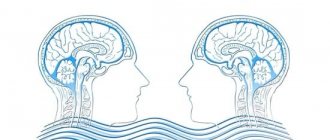Determinism is the doctrine of the mutual certainty and interconnection of all occurring phenomena and processes. The principle of determinism in psychology means, first of all, the need to study all the natural dependencies of mental phenomena on the causes that give rise to them. The mental characteristics of living beings are determined by their usual way of life. But along with its change, their mental activity begins to change.
The dynamics of the mental capabilities of animals completely depend on the basic evolutionary processes. And the development of the human psyche depends on the general progress of society and the relevance of its laws, as well as methods of production, which, according to K. Marx, influence political, social and spiritual life processes.
Articles on the topic
- Tired of loneliness: how to cope with the problem 10.19.2021
- Psychology of deviant human behavior 10/13/2021
- Labor psychology: main tasks and features 10/12/2021
- The dangers of bad upbringing and how not to make fatal mistakes 08/25/2021
Fathers and Sons
The most contentious Western debate regarding human behavior is briefly called “nature versus nurture.” Proponents of the natural theory believe that all problematic aspects or achievements are written in DNA.
Proponents of the educational approach see the repeatability of the environment from generation to generation - and thus the repeatability of behavior among relatives. None of these approaches can be considered completely right or wrong.
Soft influences
Social determinants are the effects of the microenvironment on an individual. Their difference from cultural ones is that their influences are more immediate and everyday. Academician Pavlov called the result of such influences conditioned reflexes. It is these determinants of behavior that are easiest to change. However, even social adjustments are sometimes difficult. The more complex the psyche of a person, the more difficult it is to change his or her determinants. This is an axiom from systems theory.
So what is more important – nature or environment? Even the use of the method of studying separated twins does not always shed light on this problem, since, fortunately, there are few examples of such families. It must be remembered that human behavior cannot be completely reduced to three types of determinants.
It is much more complex due to the fact that it is flexible and changeable. It cannot be predicted using the “given” - “result” model, at least not in complex forms, such as learning, love, religious practices. “Given” is constantly changing: a person receives new information or previously forgotten information “pops up” from his memory. But what exactly will come to the mind of this or that person is impossible to predict. This is why it is so difficult to deal with predictions in behavioral science.
Types of determinism
Determinism is an approach that can be considered in different areas and taking into account certain factors, depending on which the phenomenon is classified into certain types:
- psychological determinism (the surrounding culture and social norms further determine a person’s mental state);
- historical determinism (the approach is based on the principle of certainty, which takes into account 2 elements: the predictability of events, based on the real prerequisites for their occurrence and random forms of their implementation, which can be determined using probabilistic statistical laws, as well as the role of people, based on meaningfulness and rationality their goals and actions);
- biological determinism (behavior is controlled by human genes and hereditary characteristics);
- technological determinism (the social development of humanity refers to technical progress);
- materialistic determinism (material production plays a decisive role in determining living conditions. Such forms of social consciousness as religion, philosophy, morality, law are also determined by material production, which must be studied to understand life processes);
- theological determinism (recognition of the existence of a theological system that views human actions as actions determined by God);
- reciprocal determinism (people function as a result of dynamic interactions between their behavior, environment and personal characteristics).
Definitions
What does the principle of determinism in psychology say? A scientific principle is based on a number of concepts that scientists operate with.
Determinism in psychology
There are three key methodological principles of psychology: determinism, systematicity and development.
The principles of consistency and development are clear to understand.
Systematicity means the presence of connections between various manifestations of the psyche, and development and types of processes occurring.
The concept of determinism is not so clear. This is the recognition of a direct relationship between phenomena and the factors that give rise to them.
That is, when studying any mental phenomenon, it is necessary to analyze the conditions of its occurrence. Only in this case can we talk about creating a complete picture of the present. Not all scientists agree with this opinion.
Deterministic approach
This is a scientific approach, according to which all occurring processes are not random, but have a specific reason.
Determinism considers causality as a set of circumstances that determines all processes. At the same time, it is recognized that it is impossible to explain all phenomena by causality alone.
Other forms of determinism that are key:
- systemic , individual elements of the system depend on the characteristics of the whole,
- feedback , the consequences have a direct impact on the cause that caused them,
- statistical , the same reasons can lead to different consequences, subject to a statistical pattern,
- target , the task set determines the result that will be achieved in the process of activity,
- self-determinism , demonstration of the ability to direct oneself and control one’s actions in accordance with existing needs.
Determination of behavior
What does the determination of behavior imply? A person’s behavior is determined not only by his individual character traits and the current situation in which he operates, but also by the specifics of the social environment around him.
The immediate environment (family, friends, acquaintances) influence the formation of a system of values and life attitudes.
It is in the process of socialization of a child in the family and in society that he learns moral and ethical standards and comprehends the principles of behavior. His personal qualities are supplemented by information coming from outside.
In addition to the immediate environment (microenvironment), a person is also influenced by society as a whole (macroenvironment). Political, economic, sociocultural and historical processes form social norms, rules of behavior, typical processes and phenomena.
This leads to the development of certain behavioral stereotypes, habitual views and opinions in a particular society.
To become a full-fledged citizen and achieve social well-being, you must comply with these stereotypes and rules.
Cultural determinism holds that all human behavior is explained solely by sociocultural causes . It is the level of a person’s culture that determines his emotional reactions, behavior, etc.
Thus, internally, “I”, under the influence of life in society, is supplemented and transformed into “I-image” . The inner “I” is understood as the entire set of individual personality traits, temperament, character, values, ideas about oneself and the world.
But often a person in the process of his social life encounters phenomena that conflict with his inner personality.
In this case, “I-image” comes first; this is the social behavior that a person demonstrates in order to effectively interact with others .
The principle of determinism in psychology
Determinism in psychology became a continuation of the philosophical theory about the interconnection of phenomena. He views cause as a set of circumstances that precede and cause the effect.
According to many scientists, the theory of determinism is equally valid for people and animals. A series of experiments on rats showed a direct relationship between the level of mental development of animals and their adaptive ability. The more active rats survived and gave birth to offspring.
Experiments with British student volunteers also monitored their reactions to changes in the organization of the educational process. According to the results of the experiments, it turned out that the highest scores were received by those students who could quickly react and change their behavior in accordance with the situation. For these “lucky” people, circumstances turned out well in most cases. This confirms the theory that the psyche develops and changes, but behavioral reactions depend on external factors.
Determinants of psychological development
Determinism in psychology is an approach that determines the factors that determine human behavior and his internal mental processes. Mental development depends on many reasons, which can be classified into objective and subjective.
Objective determinants of psychological development
These factors determining mental development include macrosocial elements:
- the level of development of society in terms of economics and culture;
- features of raising a child;
- the level of care for a person and the degree to which his need for intimacy is satisfied;
- ethnocultural characteristics.
Objective factors of development also include microsocial and somatopsychic determinants. The first includes the processes of education in the family and other small social groups (kindergarten, school).
Somatopsychic factors include:
- genetic characteristics;
- illness;
- temperament.
Objective determinants differ in that the child is not their active subject and participant in the sense that certain processes do not depend on the characteristics of a particular person, but satisfy the interests of some groups of people (as in economic factors) or are simply an extraneous circumstance (genetic characteristics , illnesses).
Subjective determinants of psychological development
Despite the fact that subjective factors depend on objective ones, they are an important part of the internal logic of human development, especially self-development. These determinants include features of the development of the need-motivational sphere, the formation of a person’s consciousness and self-awareness, and his behavioral style.
Determinism in psychology is the dependence of mental processes on certain determinants, which can be objective and subjective. This approach is used for comprehensive scientific work and has become one of the fundamental psychological principles, highlighting the need for a comprehensive study of psychological phenomena.
Author: Anna Fleyman
Determination term
In most cases, the term determination is used to explain events, phenomena or processes that are inevitable or predetermined.
They cannot happen differently due to the influence of all the factors influencing them.
At the same time, this concept is used in many different fields of activity and sciences, which is why it can acquire certain features depending on the context of its application.
Features of understanding the term
The principle of determination implies that everything that happens is determined by fate, God, higher powers or other external factors. This applies, among other things, to the course of human life or the history of society as such.
There are the following subsections of determination:
- Theological determination, also called the doctrine of predestination. He studies the influence of higher powers (deities or God) on events, phenomena or processes.
- Cosmological determination. Mainly it studies the influence of nature on certain human actions.
- Anthropological-ethical determination. Its object of study is the human will, which characterizes each individual.
- Social determination. She studies the development of society as an integral structural unit.
Thus, each individual type of determination makes it possible to identify and analyze certain existing connections between various factors influencing a specific event or phenomenon.
Based on the principle of determination, we can conclude that people have no choice as such. That is why they should not be held responsible for many of their actions. This is due to the fact that the latter are predetermined in advance.
As a result, some scientists argue that there can be only one future for humanity and the world as a whole. Such experts deny the possibility of the existence of parallel Universes or several time currents.
Thus, there is virtually no significant difference between determination and fatalism.
Pierre-Simon Laplace studied absolute determination. He was a famous French mathematician, mechanic, physicist and astronomer of the late 18th – early 19th centuries.
The main postulate of this scientist was as follows: if any creature in the Universe can find out the speed and position of all particles existing in the world, it will not be difficult for him to predict all the events that will occur in the future.
Due to such possibilities, this creature entered the history of philosophy under the name of Laplace's demon.
Principle
The problem of determinism occupies an important place in psychological science, since it directly affects issues of will, freedom of choice, and responsibility for one’s destiny.
Self-determination is the ability of a person to choose and have his own opinion. It is this skill that distinguishes people from other living beings.
The complexity and paradox of the issue often leads many scientists to move towards indeterminism.
Among Russian and foreign scientists, however, there are representatives of a strictly deterministic approach who substantiate the relevance of this teaching.
Authors
Outstanding psychologist and philosopher S.L. Rubinstein developed an activity approach in psychology, based on a general philosophical principle: external causes have an impact through internal conditions.
Thus, according to the scientist, an individual’s brain activity develops under the influence of external environmental conditions. As a result of a person’s relationship with the outside world, the nervous system is formed.
L.S. Vygotsky argued that there is a certainty of mental processes based on causality. Nothing can happen randomly, without any reason. Thus, the manifestation of human will is based on the principles of regularity and necessity.
According to K. Höfer , any event arises on the basis of previous phenomena and conditions, the laws of nature.
Determinism manifests itself not only in our understanding of science and objective phenomena, but also in the formation of ideas about life: freedom of choice, manifestation of will.
Theory, briefly
The basis of the psychological approach lies in the philosophical theory according to which there is a universal relationship and interdependence between the phenomena of the surrounding reality.
The first aspects of determinism were formulated by the ancient Greek atomistic materialists.
The principle was then considered by representatives of the classical school of philosophy.
In the 17th century, the presence of causality in all phenomena in society was determined. With the development of science comes the understanding that any event or phenomenon is a pattern of some causes .
Currently, the theory is actively used to explain the development and functioning of various phenomena.
In the social sciences, the approach allows one to analyze the patterns of social development, the degree of influence of social norms and principles on human behavior.
In special sciences, the principle is used to designate constant connections in various processes, mechanisms, equations, etc. That is, processes or mechanisms that can be described and predicted in a strictly unambiguous manner are deterministic.
The presence of the aspect of probability, variability, instability indicates the action of the opposite principle, indeterminism (the absence of patterns and dependencies in nature, in society).
The reasons for our actions
A person cannot exist outside the environment, outside the context. In the process of its formation, it actively interacts with the environment, society, and culture. He, as a person, influences all this, but the environment also influences him.
Even as an adult, you are constantly changing under the influence of many environmental factors. Moreover, this has been proven even at the physiological level. By reading this article, your brain changes, new neural connections are formed in it. And if your brain changes, then you yourself change and, as a result, your actions and the decisions you make change.
For every change that happens in you, there is a reason.
Photo by Jakayla Toney from Pexels
Determinism is shared by:
- biological – related to survival;
- social – influence of other people;
- personality activity - we influence reality, and it influences us;
- self-determinism - we are able to influence ourselves.
The latter is important when considering determinism and free will.
Who are called determinists?
- We are talking about people who are adherents of one or another direction of this teaching. They emphasize that a person essentially lacks free choice, since his actions are determined by the causality of phenomena. In other words, any action is dictated by motivation that dominates the psyche, and not by character traits or internal motivations.
Teaching
- But is it really possible to remain inactive today? Hardly. Likewise, determinists simply find in this term a justification for this or that action, pointing out the interconnection of factors that influenced it.
Evolution of the principle
For a long time, psychological determinism relied on mechanical determinism. Mental phenomena were considered as a semblance of the interaction of mechanisms (machines). This view was limited; it considered mental phenomena only as a result of external influence. Based on this vision of determinism, the doctrines of reflex, affect, associations and others arose.
From a different point of view, determinism was considered by I. Sechenov, F. Donders, G. Helmholtz. They believed that mental reactions caused by external influences on the body are not formed according to physical and biological laws, but act as special regulators of behavior.
Modern determinism has adopted much from the philosophical theory of dialectical materialism. The principle of determinism in relation to the human psyche, in accordance with it, sounds like this: “By making changes in the real world, which does not depend on consciousness, a person changes himself.” Simply put, thanks to human activity, external (spiritual, material) products and internal (essential) forces arise.
What is indeterminism?
Indeterminism is a philosophical doctrine that denies either the objectivity of causality or its value in knowledge from the point of view of science. Representatives of the doctrine are opponents of determinism and believe that the human will is an autonomous force that is not subject to any laws or reasons.
The ideas of historical indeterminism began to spread in the second half of the 19th century in a number of philosophical schools (philosophy of life, neo-Kantianism). These concepts try to reveal the qualitative specificity of social cognition and the historical process, giving the leading importance to chance in them.
Scientific confirmation of these ideas in social cognition appears after the creation and development in the 19th-20th centuries of a statistical theory based on probability theory.
As a result of numerous studies in the field of social sciences, chance is recognized as an independent beginning of society, the constructive role of chance is affirmed as a factor of human freedom and the irreversibility of social changes, as well as the most important condition for the emergence of something new in the historical process.
Indeterminism can be theological or naturalistic. The first type denies the sufficient usefulness of nature in participating in human activities and the lives of other creatures; integrity and evolution are explained by the existence of God. Naturalistic indeterminism comes from the recognition of the natural as self-sufficient in the world system.
Also in the history of philosophy, 2 types of indeterminism have developed: objective and idealistic. The first type denies any interpretation of causality, both from the point of view of the person himself and from objective understanding. The idealistic direction considers regularity and causality to be relevant from a subjective point of view. At the same time, the objective attributes of determinism at the global level are denied.
Approaches to determining the essence of the category “determinism”
If we take the concept of “determinism” as a basis, then everything that happens in the world, including the course of human history and life, is predetermined by something (fate, gods, God, nature, etc.). Theological determinism considers the gods or God as the cause, cosmological determinism considers nature, anthropological-ethical determinism considers man and his will, social determinism considers the development of society.
Some of the philosophical theories of determinism contain the idea that reality is predetermined in some initial way, on the basis of which the category “freedom” is formed. Followers of this movement concluded that people essentially have no room for choice and, therefore, personal responsibility. In this form, determinism is defined as the statement that there is only one, precisely defined future.
Finished works on a similar topic
- Course work The problem of determinism in psychology 410 rub.
- Abstract The problem of determinism in psychology 280 rub.
- Test work The problem of determinism in psychology 200 rub.
Receive completed work or specialist advice on your educational project Find out the cost
Determinism is often understood as fatalism. The opposite of determinism is indeterminism. A proponent of absolute determinism, Pierre-Simon Laplace said that if an intelligent being could know the position and speed of all particles in the world, then he would be able to accurately predict all events in the Universe. This hypothetical was later called Laplace's demon.
Deterministic approach
It recognizes the interrelationship between events occurring in a person’s life and specific causes. The approach based on cause-and-effect relationships is actively used in modern science.
Since the middle of the last century, the use of a deterministic approach has become unstoppable. Scientists began to use it in mathematics, quantum physics, genetics and biology, and information theory. In their works, scientists focused on the important role of the concepts of possibility, probability, uncertainty, and expediency for describing natural and social phenomena.
Interactions in the theory of determinism
The temporal relationship between cause and effect has three versions of origin:
- the cause is the primary phenomenon, and it is followed by the effect;
- with close action and finite speed of cause and effect relationships, there is a gap;
- cause and effect are simultaneous phenomena, the cause arises and immediately provokes the effect, while the cause itself subsequently fades away.
In the theory of science of determinism, there is a thorny issue that concerns the concept of chance, as well as its relationship with causality and necessity. However, practically no one has any debate on the topic of defining necessity as an immutability. This was due to the development of determinism before this.
But the random can be considered as something that is not a consequence of an internal pattern, it is a consequence of external connections and relationships that have a short duration and instability.
State connections are important categories; thanks to the study of states, one can find out not exactly why this or that event happened, but how the process of its origin proceeds from beginning to end. This is a qualitative-quantitative measure of the realization of the existence of something in a certain period of time; in science it has a set of parameters of a specific object. In a broad sense, a connection between states can be independent of a non-causal connection, as is the case in a functional connection.
What is a functional connection? Such a concept means a function, as a more general form of describing sequences, all without regard to the content between objects. Such relationships are reflected in the Boyle-Marriott law, where pressure and volume are not causes of each other, despite the fact that they are functionally related to each other.
But a correlation connection is an expression of a quantitative specific correlation of objects, states, and other things
And also their correspondence to each other against the background of changes is taken into account, as well as parallelism against the background of a weak connection, which can be caused by the presence of a large time period or intermediate objects
The most developed category of determinism is scientific teleology, provided it is sufficiently developed.
Chance and Necessity
An important issue for any theory of determinism is the status of the category of randomness. The essence of the problem is as follows. If we accept the principle of causality, which is mandatory for the concept of philosophical determinism, then random phenomena should also be considered causal. But the obligatory property of causality is necessity, therefore, chance is also necessary, and the objective opposition of necessity and chance is meaningless.
If we consider the terms “accident” and “necessity”, we can distinguish two areas of their application. Firstly, these concepts can be attributed to objective reality and considered as properties of matter as a whole, independent of our perception and knowledge. This scope of application of the concepts of “necessity” and “accident” can be called objective or ontological. Secondly, these terms can be associated with epistemology and be considered as criteria for assessing events and phenomena in the objective world, used to study and detect them. This scope of the concepts “necessity” and “accident” can be conditionally called subjective or epistemological.











